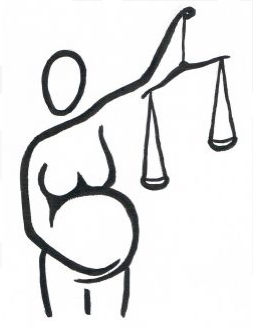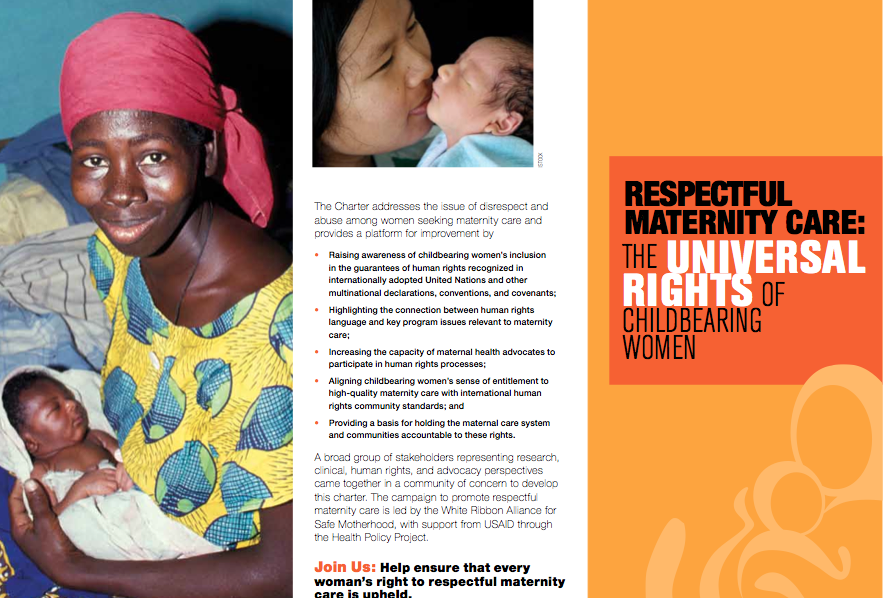Submitted by: Hermine Hayes-Klein
The United Nations has devoted this year’s Human Rights Day to “the rights of all people…to make their voices heard in public life and be included in political decision-making.” What better time to acknowledge the global movement raising its voice for human rights in childbirth. As cesarean rates skyrocket around the world, and women exchange stories of coercion and force in obstetric care, it should come as no surprise that people are organizing to demand change.
What are human rights in childbirth? Every health care system in the world faces the same essential questions. Who decides how a baby is born? Who chooses where a birth takes place? Who bears the ultimate responsibility for a birth and its outcome? What are the legal rights of birthing women? What are the responsibilities of doctors, midwives and other caregivers in childbirth? What are the rights and interests of the unborn, and who has the authority to make decisions on its behalf?
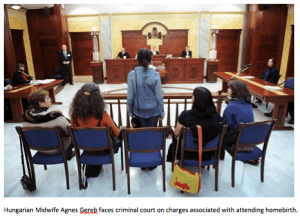 In 2010, Hungarian mother Anna Ternovszky took these questions to the European Court of Human Rights. After the healthy, safe, and empowering birth of her firstborn, at home, with the midwife Agnes Gereb, Anna objected to the fact that her ability to hire Agnes a second time was affected by the threat of legal sanction against Agnes for attending her at home. In the decision of Ternovszky v. Hungary, the Court held that birthing women have a fundamental human right to choose the circumstances in which they give birth. The foundations for this right include the rights to privacy, to autonomy, to control over our own bodies, and the right to make decisions for our children even as we are giving birth to them. Ternovszky is only binding on European nations, but this fundamental human right applies to all women everywhere. As a birthing woman, you have the right to meaningful choice and genuine support for your personal needs around and during childbirth, whether those needs are for planned cesarean section or undisturbed home birth with reliable medical backup.
In 2010, Hungarian mother Anna Ternovszky took these questions to the European Court of Human Rights. After the healthy, safe, and empowering birth of her firstborn, at home, with the midwife Agnes Gereb, Anna objected to the fact that her ability to hire Agnes a second time was affected by the threat of legal sanction against Agnes for attending her at home. In the decision of Ternovszky v. Hungary, the Court held that birthing women have a fundamental human right to choose the circumstances in which they give birth. The foundations for this right include the rights to privacy, to autonomy, to control over our own bodies, and the right to make decisions for our children even as we are giving birth to them. Ternovszky is only binding on European nations, but this fundamental human right applies to all women everywhere. As a birthing woman, you have the right to meaningful choice and genuine support for your personal needs around and during childbirth, whether those needs are for planned cesarean section or undisturbed home birth with reliable medical backup.
As a birthing woman, nobody can tell you that you “must” do anything. Nobody can “let you” or “not let you” do anything. Nobody can pressure or force you into a cesarean section that you do not believe is in the interest of yourself and your baby. Nobody can cut an episiotomy if you do not consent to one. Nobody can do anything to your body or your baby without discussing it with you first and asking for your consent. You have the right to be the ultimate authority over everything that occurs around your body’s birth of your baby.
These are the fundamental human rights of the birthing woman. And yet, these rights are so commonly violated, that most women are not even aware that they have them. In both the developed and the developing world, women are too often treated with disrespect and abuse, including subjection to unnecessary, damaging, and costly surgical interventions. They are told what will happen to them, or not even asked. As women raise awareness of problems in birth care common to most modern obstetric systems, they are realizing that many of these problems could be addressed by acknowledgment of the woman’s right to make the decisions of childbirth, of her ultimate authority over the birth process.
Many disagree that pregnant women retain the fundamental human rights applicable to healthcare. In only the last month, vocal proponents of medical birth called the 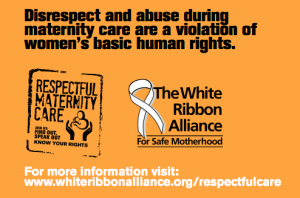 claim that birthing women have a human right to autonomy “unethical” and “morally grotesque.” What I find unethical and morally grotesque is the assertion that a doctor, making decisions about a patient , has more authority over an unborn baby than the woman who has grown it out of her own flesh and blood. Especially a doctor with a 35% cesarean section rate.
claim that birthing women have a human right to autonomy “unethical” and “morally grotesque.” What I find unethical and morally grotesque is the assertion that a doctor, making decisions about a patient , has more authority over an unborn baby than the woman who has grown it out of her own flesh and blood. Especially a doctor with a 35% cesarean section rate.
In the article linked above on moral grotesquerie, media darling “Dr. Amy” revealed her opinion that physiological birth, undisturbed maternal-newborn bonding, and the right to avoid unnecessary abdominal surgery have a value equal to manicures. I disagree, and I am not alone. Women are ready to stand up for the simple right to respectful support in childbirth. Dr. Amy claims that the right to autonomy in childbirth is a wealthy, western white woman’s concern, and she will not be the last to say so. Every woman’s movement has met this charge: “There are women dying in poverty, women who can’t feed their children, and you spoiled bitches dare to make a fuss about the right to own property/ right to vote/ right to education/ right to equal work and equal pay? You obviously have too much time on your hands.” It is true that one cannot fight for more than survival, when survival is in question. But that doesn’t mean that women have a right to survival alone. As nations challenge their birth care systems to meet Millennium Development Goal 5, they can do so in a way that replicates the institutional human rights violations of Western obstetrics, or they can evolve birth care to respect the fundamental human rights of the women they aim to assist. Ask women in the developing world if they are unconcerned with disrespect and abuse in childbirth.
The idea that the doctor, and not the woman, holds authority over decision-making in childbirth is so entrenched that it will take a paradigm change to put the woman back at the center of birth care. The momentum is building, around the world, capable of generating this transformation. The hundreds of people energized by the 2012 Human Rights in Childbirth (HRiC) Conference in The Hague became tens of thousands of people inspired by the 1000 global screenings of Freedom for Birth on September 20th. In the next week, the circle of activists will expand with the release of a 15-minute free version of Freedom for Birth and the launch of new functionalities on the HRiC website that will help people from around the world to find and join the organizations working to improve birth where they live.
If you believe Martin Luther King, Jr. that the “arc of the moral universe is long, but it bends toward justice,” then there is reason to hope that the fundamental human right to autonomy and authority in childbirth will be recognized. But the only way this will happen will be if birthing women demand their rights. As Anna Ternovszky, the plaintiff who asked justice of the ECHR, said in Freedom for Birth, “Now is the time to let our voices be heard.”
Hermine Hayes-Klein was the organizer of the Human Rights in Childbirth Conference in the Hague on May 31-June 1st of this year.
About the obirth blog: The Orgasmic Birth weblog shares the opinions of Orgasmic Birth, Sunken Treasure Publishing and the obirth team as well as weblogs submitted by our readers or guest blogs that may or not be the opinion of Orgasmic Birth. Obirth believes it is time to be BOLD in sharing our thoughts and perspectives, to challenge others to think in new ways and whether we agree or disagree, hopes to have a discussion where we can look at childbirth in new and old ways. “These are the best of times and the worst of times.” Opportunity is here to transform maternity care practices and it will take a village. We appreciate your voice and thoughts, along with resources when possible so that together we can contribute to a larger discussion where women, men and communities are empowered to Take Back their Birth!

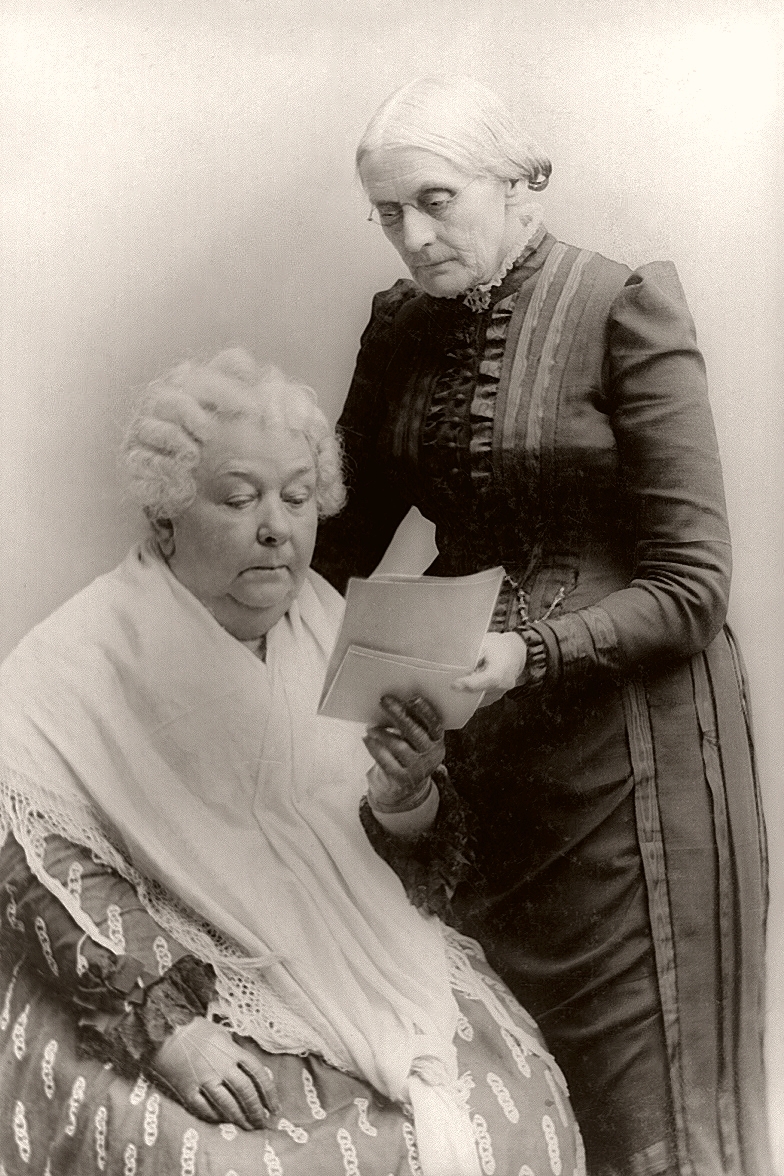 Stanton’s good friend
Stanton’s good friend  When Alice Paul was in jail, she staged a hunger strike, at which point she was put in a straight jacket and fed raw eggs through a tube down her throat until she vomited blood. She was then transferred to a sanitorium, and a psychiatrist was brought in to examine her and confirm her prosecutors’ claim that she was insane and should be permanently institutionalized. The doctor who examined her reported that she was not only sane, but she was strong, and brave. He is quoted as having added, “Courage in women is often mistaken for insanity.” Paul’s courage led to a public outcry against the mistreatment of the “suffragettes,” which in turn contributed to the passage of the 19th Amendment (by one vote!). The long struggle for the female vote holds many lessons for the movement, now uniting around the world, to demand respect for women’s fundamental rights in childbirth.
When Alice Paul was in jail, she staged a hunger strike, at which point she was put in a straight jacket and fed raw eggs through a tube down her throat until she vomited blood. She was then transferred to a sanitorium, and a psychiatrist was brought in to examine her and confirm her prosecutors’ claim that she was insane and should be permanently institutionalized. The doctor who examined her reported that she was not only sane, but she was strong, and brave. He is quoted as having added, “Courage in women is often mistaken for insanity.” Paul’s courage led to a public outcry against the mistreatment of the “suffragettes,” which in turn contributed to the passage of the 19th Amendment (by one vote!). The long struggle for the female vote holds many lessons for the movement, now uniting around the world, to demand respect for women’s fundamental rights in childbirth.


 Photo taken in September from one of the first protest in Argentina, a protest on the words "I choose where and how to give birth" (yo elijo como y donde parir)
Photo taken in September from one of the first protest in Argentina, a protest on the words "I choose where and how to give birth" (yo elijo como y donde parir)